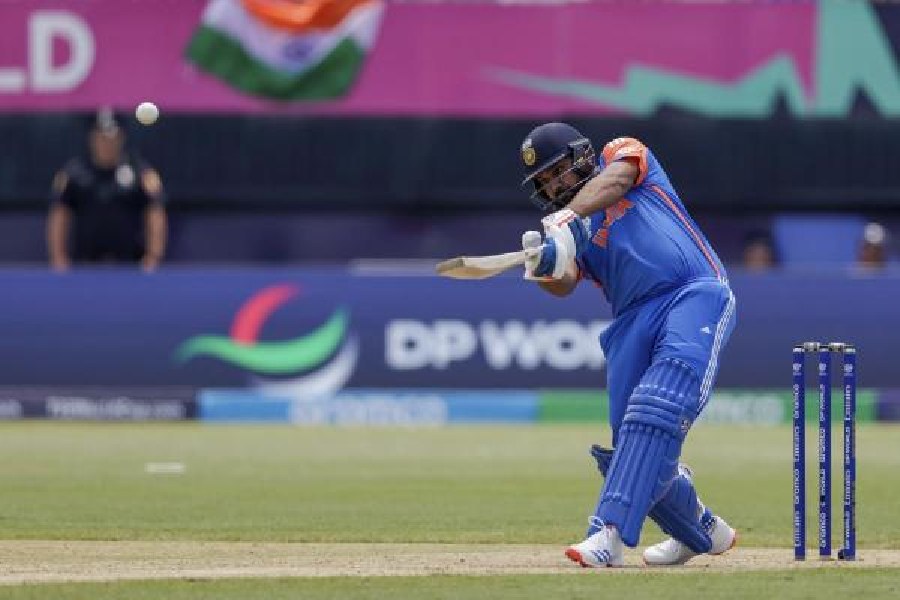Ireland pacer Josh Little’s delivery was slightly short and as Rohit Sharma went for the pull, its climbing trajectory took him by surprise. It clearly missed the bat and deflected off his right upper arm before landing in the hands of backward point.
The blow was painful but Rohit refused to show it as Ireland reviewed without any luck. What followed was two consecutive sixes before the Team India captain, having completed his half-century, walked off retired hurt in the next over gesturing to his shoulder.
Rishabh Pant too was smacked on his left elbow a little later. The conditions at the Nassau County International Cricket Stadium in New York on Wednesday have left the International Cricket Council (ICC)’s bid to promote the game in the US in a quandary.
For the second game running in New York, teams batting first failed to cross 100. The new ball reared in an outlandish manner, leaving the batters at the mercy of the fast bowlers. It came with a statutory safety warning: if the uneven and steep bounce didn’t get you, the lateral movement would.
The concerns would have invited serious sanctions from the ICC at any other venue, but the global body is committed to making cricket popular in the land of baseball and American football ahead of the 2028 Los Angeles Olympics where the game will make a return after 128 years.
The ICC’s desired goal of standard playing conditions for even contests in a World Cup has been ripped apart on this drop-in wicket which hasn’t gone through the mandatory test. The India-Bangladesh warm-up match was the only one slotted there before being thrown open to the T20 World Cup.
Andy Flower didn’t hide anything when he said the pitches were “bordering on the dangerous”. The ground is learnt to have been handed over to the ICC only a day before the warm-up fixture. As a result, Rohit and Rahul Dravid couldn’t even have a proper look at the wicket ahead of their opener.
There is a possibility that the remaining six matches will be played on two more pitches on offer though they are unlikely to be vastly different.
The six practice pitches nearby at Cantiague Park have been similarly spicy. So much so that the South Africa batters refused to bat at nets against their own fast bowlers.
But why this blunder when drop-in pitches are in vogue at the Melbourne Cricket Ground and various venues in New Zealand?
The ICC had left it to Damian Hough, who runs a consultancy business, Adelaide Oval Turf Solutions, for four drop-in pitches needed for the wicket block at the modular stadium.
The pitch trays were constructed according to Hough’s instructions and assembled in Florida.
“The reason the pitches are being grown in Florida (and not New York) is that it’s the warmest part of the US during winter. New York is regularly freezing, and grass doesn’t grow at that time of the year,” Hough was quoted as saying by cricket.com.au.
Dark clay-based soil called ‘Black Stick,’ used in baseball pitchers’ mounds, which display a character similar to Australian pitches, were used. They were then
shipped to New York and installed in the pit created for the wicket block.
It is believed that the pitches never got the “bedding-in period” required for it to settle down. With no proper time frame allowed, this has resulted in its underprepared nature.
“New ground, new venue, wanted to see what’s it like... I don’t think the pitch settled down... there was enough for the bowlers,” Rohit said after the eight-wicket victory.
Stung by the turn of events, the ICC on Thursday said: “...the pitches used so far... have not played as consistently as we would have all wanted. The world-class grounds team have been working hard... to deliver the best possible surfaces.”
The circumstances led to India’s growing concerns over the Pakistan pace attack, comprising Shaheen Afridi, Naseem Shah, Mohammad Amir and Haris Rauf.
“I don’t know what to expect against Pakistan, we will prepare like what the conditions are going to be,” Rohit said.
The ICC should never have taken the emotions of the two countries for granted in such a delicate contest with high stakes.










